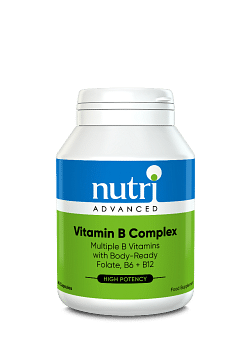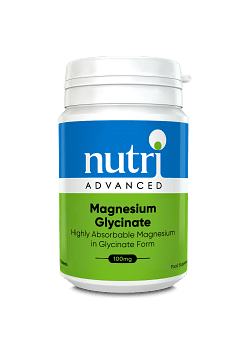A Nutritionist's Guide to Supporting Anxiety Naturally
Why you can trust Nutri Advanced Every article on our site is researched thoroughly by our team of highly qualified nutritionists. Find out more about our editorial process.
What causes anxiety and why does it appear so commonplace?
It is perfectly natural to have times of anxiety, for example, if you have a job interview, or an exam, as we may feel some anticipation, or fear and worry that we will perform our best. Anxiety is the body’s normal reaction to danger or a threat; when we feel pressured or are facing a challenging situation. Our nervous system moves into “fight or flight” mode, activating the sympathetic nervous system, triggering an acute stress response preparing us to fight or flee. This means we will have heightened awareness, be on the alert, ready to act and respond quickly. Your heart rate increases, and you may start to sweat. This is a survival instinct that is inbuilt and has protected us since ancient times.
Natural moments of anxiety that resolve, are normal. But sustained anxiety or heightened, excessive anxiety is not. Unfortunately, anxiety is on the rise, and there are many reasons for this. I believe that social media has a definite role in the increased anxiety amongst many, especially the youth. The pressure seems overwhelming for them to be “liked”, the pressure to always look good, and it’s all about how you are perceived, as people only show their perfect filtered life on social media - what a never-ending challenge it is to live up to that!
Living through the COVID-19 pandemic for over the last 2 years, is an example of a situation that for many people, has caused (and for many is still causing) both sustained and heightened anxiety. Anxiety soared throughout the community, across all ages, and life circumstances. Anxiety over health and vulnerability, job security or loss of job and income, isolation from friends and family, especially during those times of home schooling and lockdown. Mental health challenges have and are affecting more than ever currently, with anxiety being top of the list for many. For all of us, it is important to know how to best support ourselves through the stresses that life brings.
What effect – short and long-term – can anxiety have on our health?
Short-term anxiety that arises and then dissipates once the thing that has worried you is over or has been completed is ok, because it has been resolved. The body moves easily between “fight or flight” mode into “rest and digest” mode. This happens with a well-balanced, healthy nervous system.
Long-term anxiety is a different story. If anxiety is so great that it is negatively impacting your life and especially if it is longstanding, then this may be defined as an anxiety disorder. Here the body may be stuck or trapped in “fight or flight” mode, unable to switch off and relax. Physiologically, this puts a huge strain on our nervous system and our adrenal glands, which are super important as they help to modulate our stress response, especially the release of adrenaline and cortisol.
Can you offer a health nutritional and lifestyle plan to support those with anxiety?
The first step to dealing with anxiety is to recognise that you have anxiety.
One of the quickest ways to move from “fight or flight” into “rest and digest” is through the breath. When we are anxious, we may be “mouth-breathing”. This will only increase anxiety. Really focus on deep, slow breathing, in through the nose and out through the mouth. Slow your breathing down. Focus on it, deep breathe continuously for as long as needed to help bring about calm.
Nutritionally, it’s super important to nourish your body and mind, which will support your stress responses and nervous system. Balanced blood sugar levels are also key to stabilising your mind, mood and energy levels. Ensure your meals and any snacks all contain good quality protein and fats. Reduce refined carbohydrates and sugars, as these destabilise your blood sugar levels which may exacerbate anxiety.
Magnesium is known as “nature’s tranquiliser”, as it helps to calm and relax muscles and the nervous system. It does over 600 different functions in the body, so we need adequate amounts on a daily basis so that we don’t become deficient, which unfortunately, many people are – especially those suffering with anxiety! Increase your green leafy vegetables, as well as nuts and seeds. Consider taking a magnesium supplement daily.
Theanine is an amino acid that has been shown to increase the alpha brain waves, bringing us into a more meditative brainwave state of being. Theanine is found in green tea, which explains why despite green tea containing caffeine, you may feel calmer and more peaceful when drinking it.
The B Complex vitamins are extremely important for our nervous system and our ability to handle stress. We may not be able to control the stressors in our lives, but we can help the way we respond to it! A vitamin B complex will help you feel calmer and more grounded, whilst helping with memory, concentration and focus, as well as energy levels.
Omega-3 fatty acids are also extremely important to support mental health and our nervous system. EPA and DHA are the two most important omega-3 fatty acids, and it is EPA that is especially important when dealing with anxiety. Many people are deficient in omega-3 fatty acids so adding a pure and stable omega-3 fish oil (or a vegan option if need be) supplement may be required.
About Elouise Bauskis ND, BSc, DN, DBM
Elouise is an Australian-trained Naturopath, Nutritional Therapist and Herbalist with 15 years’ experience in private clinical practice and 20 years’ experience within the Complementary and Alternative Medicine Industry. She is a fully registered and insured Practitioner and a member of both the Association of Master Herbalists and the General Naturopathic Council. Elouise has a wealth of knowledge and experience, expanded and honed over many years. She is able to translate complicated information into easily understood and logical concepts for clients and is inspired to educate and empower them to make life-long, positive health changes.
This website and its content is copyright of Nutri Advanced ©. All rights reserved. See our terms & conditions for more detail.
Nutri Advanced has a thorough research process and for any references included, each source is scrutinised beforehand. We aim to use the highest value source where possible, referencing peer-reviewed journals and official guidelines in the first instance before alternatives. You can learn more about how we ensure our content is accurate at time of publication on our editorial policy.
Most Popular Articles
-
7 Surprising Ways To Support Your Magnesium
If you are displaying signs of a magnesium deficiency, here are 7 ways to boost your magnesium levels that are easy to incorporate into your daily life. -
5 Best Vitamin C Supplements Picked By Our Experts
Learn more about the different types of vitamin C, the different benefits you get from different types, and what you get for spending more on a good supplement. -
Top 5 Vitamins For Energy And Tiredness Picked By Our Experts
The 5 best and most important vitamins for energy & tiredness including B vitamin food sources & best supplement forms for energy. -
Benefits of Myo-Inositol for Polycystic Ovary Syndrome (PCOS)
In this research review article, we take a closer look at a lesser-known natural compound called myo-inositol that has been found to have significant potential to improve many of the prevalent features of PCOS. -
Top 10 Reasons to Give Your Kids Omega-3
Read the top 10 reasons that kids should have plenty of Omega-3- an essential fatty acid- including for depression, brain function, sleep & reading/maths skills.













